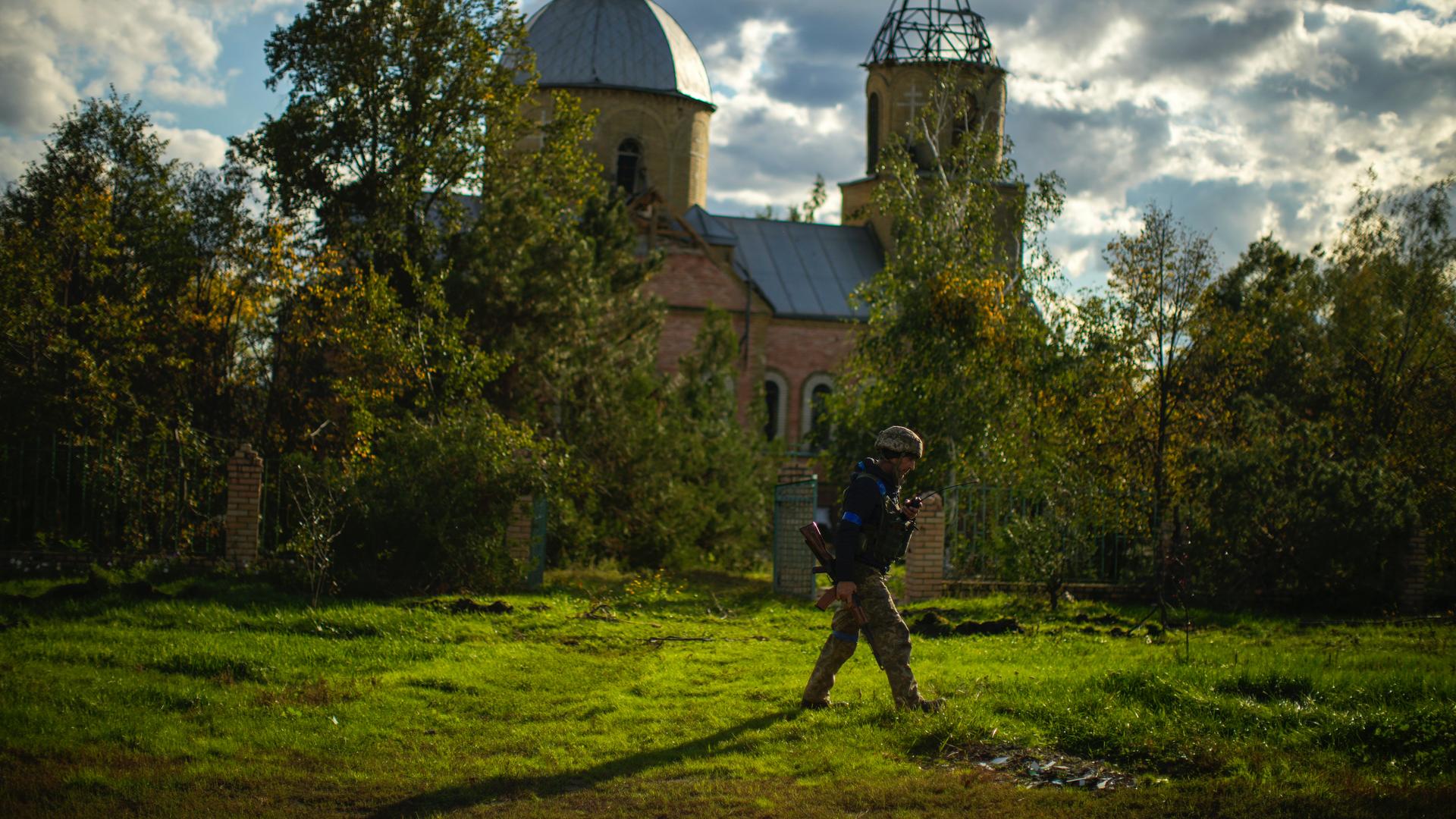Andriy Zelinskyy, a Kyiv resident, didn’t grow up with religion in western Ukraine because the republic was then part of the former Soviet Union, which banned it in favor of atheism.
That began to change when he was 12 — the Soviet system was falling apart, and Ukrainians were undergoing a process of religious discovery.
“We were all co-educating each other, we were all seeking our ways to a new period in human history, because we are talking about the end of the Soviet era,” he said. “So, the church was everywhere, and the dream of an independent free Ukraine was everywhere as well.”
Ukraine became an independent country in 1991. And with that, religious institutions started opening up.
Zelinskyy, now in his 40s, felt called by the Ukrainian Catholic Church, and he became a Jesuit priest. But he focused for many years on academia, not pastoral care — until 2005, when he became a military chaplain.
Now, Zelinskyy is among those in Ukraine trying to help others in the country cope with the ongoing trauma of war. He visits troops on the front lines and provides counseling and religious services.
Being a military chaplain, he said, is a deeply meaningful way to serve.
For many years, Zelinskyy said, it was hard to imagine Ukraine going to war. But that’s exactly what happened in 2014, when Russian forces invaded Ukraine. Zelinskyy followed Ukrainian troops to the front lines. He was in the trenches with them, often for months at a time.
“It was then I [became] a witness to this miracle, how at the beginning of the 21st century, somebody can be so authentic in terms of values. When values are not mere words but when they become somebody’s life, especially in the face of death.”
Zelinskyy talks about the values of freedom, dignity and sacrifice.
On the front lines, he said that he’s witnessed that these are not simply words for Ukrainian troops.
But it comes with a cost.
“When you are witnessing the atrocities, when you are witnessing this amount of violence especially nowadays, that’s when our humanity feels wounded, and wounded humanity is not good, wounded humanity requires treatment, and it is important to provide proper treatment.”
And that’s where Zelinskyy’s role comes in, he said, as a military chaplain.
Part of the treatment or the service that chaplains provide, is simply their presence even under dangerous circumstances.
“There is one important art that a military chaplain must be armed with, and that is the art to be able to listen and to hear what people have to say to you,” he said. “You got to help a wounded person get in touch with his or her own spirit, with his or her dreams, to help people find hope.”
Helping veterans find hope after they reenter society as civilians is vital, too.
Nataliia Zaretska is a military psychologist.
She said that she often confronts some resistance from veterans. For many of them, meeting with a psychologist is still taboo.
“All veterans, all militaries are the same, so it’s natural, it’s normal, stigma of psychological or mental health support, sure, so it’s OK,” she said.
Zaretska, 47, is working with the Center for Psychological Assistance in Bucha, a Kyiv suburb that was occupied by Russian forces, and later liberated by Ukraine.
Evidence of Russian atrocities in Bucha became well-known around the globe.
When Zaretska first arrived there, she took time to process what she was seeing.
“I had several days when I was in deep sorrow, just it was my reaction as a human, because I understood that, I know what it is,” she said. “I know a lot about torturing, I know a lot about very awful things from my professional life.”
She heard plenty of awful things from people in Bucha, including the stress and isolation they went through under Russian occupation.
“It’s important to understand the principal difference between normal peaceful life and war life, it’s absolutely another life, but it is still life,” she said. “So, when you are under war, when you are under occupation, you continue to live.”
Zaretska said that there’s a specific type of psychological pressure called compression. And, coming out of that state, she said, is a process.
“After the release, every person needs time to feel that, maybe I’m not in a hostile environment. So, every person needs time to give back control of her or his life.”
Zaretska said that this process can’t be rushed, or there could be negative consequences.
She said that her role, as a mental health professional, is to help people tap into their inner strength.
“Mentally or emotionally, I can say to you that I’m proud of people. After going through all these awful situations, and being alive, and being ready to communicate, they are really very very strong people, they are stronger than most of us.”
Zaretska said that there’s a lot of work to do for the people of Bucha.
She’s been on overdrive for months now, but she said that she’s focused on one long-term goal: “I want Bucha to be a symbol of recovery. Bucha is already the symbol of war crimes, of Russian war crimes, I want Bucha to be a sign of recovery, and I’m sure that it’s absolutely realistic.”
Zaretska said that Bucha is already on that path. And looking ahead, she said that she hopes people throughout Ukraine get the care and support they deserve to come to terms with all the suffering they’ve been through.
Our coverage reaches millions each week, but only a small fraction of listeners contribute to sustain our program. We still need 224 more people to donate $100 or $10/monthly to unlock our $67,000 match. Will you help us get there today?
